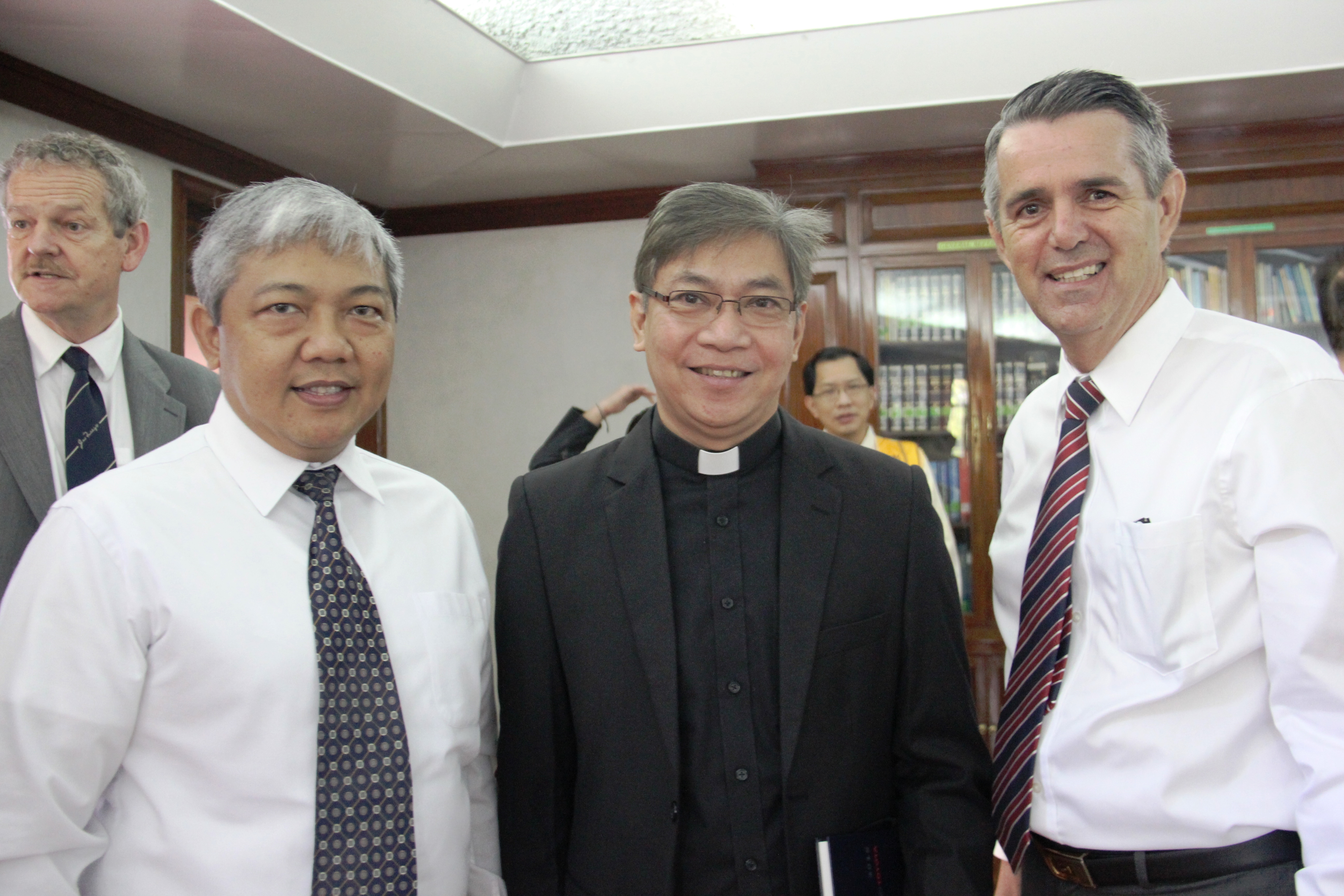The Church of Jesus Christ of Latter-day Saints joins other religious leaders in supporting this week’s interfaith celebration in an effort to carry the message of interfaith harmony and goodwill in all places of worship based upon the foundation teachings of love of God and neighbor.

Elder Pajaro (left) and President Ardern (right) thank Rev. Fr. Carlos Reyes (center) for the invitation to the interfaith breakfast organized by the CBCP Episcopal Commission on Interreligious Dialogue and the Archdiocese of Manila.
Promoting a culture of peace and non-violence as well as inter-religious dialogues, the UN proclaimed in 2010 the formation of "World Interfaith Harmony Week" celebrated annually in the first week of February among all religions and faiths. Likewise, Republic Act 10525 declares the first week of February of every year as "World Interfaith Harmony Week."
Interfaith Efforts of The Church of Jesus Christ of Latter-day Saints
A respect for the diverse beliefs and unique contributions of all the world’s faiths is one of the hallmarks of Mormonism. From the earliest days of The Church of Jesus Christ of Latter-day Saints, Joseph Smith elevated the principle of religious liberty and tolerance: “We claim the privilege of worshiping Almighty God according to the dictates of our own conscience, and allow all men the same privilege, let them worship how, where, or what they may” (Articles of Faith 1:11).

Single Adults from different Evangelical Churches, Islam and The Church of Jesus Christ of Latter-day Saints participate in a Peace Camp.
In that same spirit, Church President Thomas S. Monson made a plea during general conference, a semiannual worldwide meeting, for more religious understanding: “I would encourage members of the Church wherever they may be to show kindness and respect for all people everywhere. The world in which we live is filled with diversity. We can and should demonstrate respect toward those whose beliefs differ from ours” (April 2008 General Conference address). Latter-day Saints accept all sincere believers as equals in the pursuit of faith and in the great work of serving humanity.
Emphasizing God’s love for all people, not just those of one religion, President Dieter F. Uchtdorf of the First Presidency, the highest governing body of the Church, declared: “We honor and respect sincere souls from all religions, no matter where or when they lived, who have loved God, even without having the fullness of the gospel. We lift our voices in gratitude for their selflessness and courage. We embrace them as brothers and sisters, children of our Heavenly Father. … He hears the prayers of the humble and sincere of every nation, tongue, and people. He grants light to those who seek and honor Him and are willing to obey His commandments” (April 2008 General Conference address).

Different religious leaders participate in a Family Summit organized by the Manila North Multistake (diocese) Council of The Church of Jesus Christ of Latter-day Saints.
The late Krister Stendahl, emeritus Lutheran Bishop of Stockholm and professor emeritus of Harvard Divinity School, established three rules for religious understanding: (1) When you are trying to understand another religion, you should ask the adherents of that religion and not its enemies; (2) don't compare your best to their worst; and (3) leave room for "holy envy" by finding elements in other faiths to emulate. These principles foster relationships between religions that build trust and lay the groundwork for charitable efforts.

Catholic Relief Services volunteers and Mormon Helping Hands work together in one of the temporary shelter sites which is a joint project of both organizations.
The spiritual and physical needs of the world require goodwill and cooperation among different faiths. Each of them makes a valuable contribution to the larger community of believers. In the words of early Church apostle Orson F. Whitney, “God is using more than one people for the accomplishment of his great and marvelous work. The Latter-day Saints cannot do it all. It is too vast, too arduous, for any one people.” Thus, members of the Church do not view fellow believers around the world as adversaries or competitors, but as partners in the many causes for good in the world. For example, the Church joined forces with Catholic Relief Service in building to shelters in Cagayan de Oro and Davao del Norte after Typhoons Sendong and Pablo. The Church also worked with Adventist Development and Relief Agency (ADRA) provide food and hygiene supplies after calamities that hit the Philippines for the past three years.

620 hardworking and skillful graduates of Basic Carpentry from The Church of Jesus Christ of Latter-day Saints were hired by Catholic relief Services (CRS), Word Vision, the National Housing Authority (NHA) and private contractors to help in the many housing projects mushrooming all over Tacloban. They belong to the team that built the first 3,210 shelters in 3 months after Yolanda barreled through Tacloban, Carigara, Tolosa, Ormoc and Samar.
It is important to note that interfaith cooperation does not require doctrinal compromise. Though the Church asserts its ecclesiastical independence and recognizes its doctrinal differences, this does not prevent it from partnering with other faiths in charitable projects. These efforts are based on universal values. A different interpretation of the atonement of Christ, for example, need not diminish themandate of Christ to “love thy neighbor as thyself.” Therefore, it is necessary to maintain a separation between charitable efforts and doctrinal tenets, while at the same time sharing mutual concern for those in need. People of good faith do not need to have the exact same beliefs in order to accomplish great things in the service of their fellow human beings.